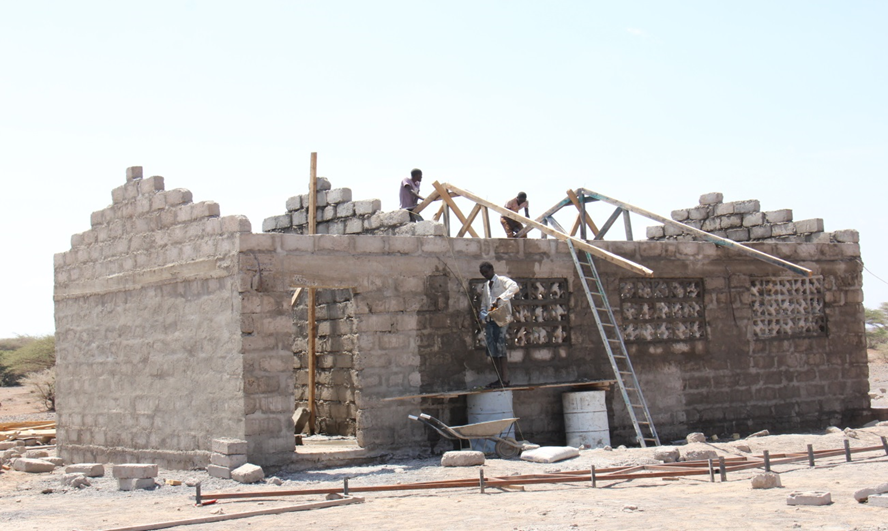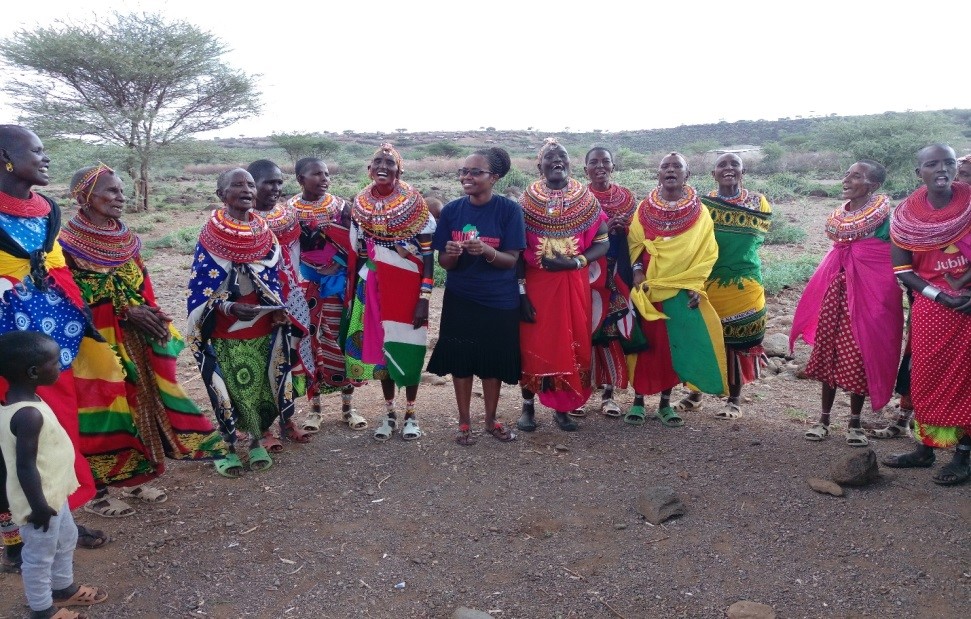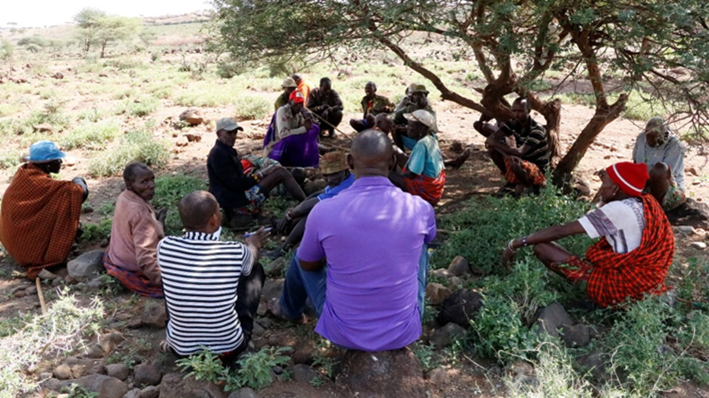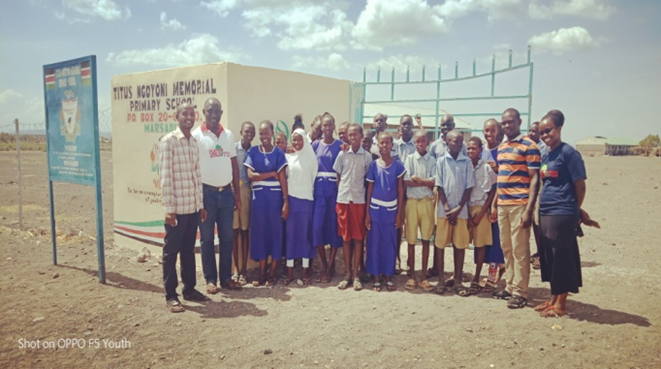‘‘Throughout our lives we have only known conflict which has resulted to loss of lives, loss of livestock, displacement and destruction of livelihoods. Our children have grown up in fear, tension and uncertainty. Education has been a far-fetched dream to us and our children. Shalom has opened a new chapter in our lives as we now have hope that conflicts with our neighbours will be addressed. The newly built classroom is nothing short of Shalom’s commitment to transform the lives of our children,’’ commented Sora Boru, elder from El-Buru Magado community in Gas, North Horr Constituency, Marsabit County.

Ongoing construction of a Shalom’s funded classroom in El Buru Magado Primary School in Gas, North Horr Constituency in Marsabit County.
Marsabit County in the Northern part of Kenya is characterized by protracted inter-communal conflicts mainly among the Samburu, Turkana, Gabbra, Borana, Dassanech and Rendile. The conflicts patterns in the County are attributed to numerous complex factors depicted in the competition over natural resources (particularly water and pasture), land and boundary disputes, political incitements, revenge and cultural practices. These sporadic conflicts have led to devastating impacts on the conflicting communities including loss of lives, loss of livestock, disruption of livelihoods and socio economic activities, poverty, and, closure of hospitals, markets and learning institutions. At the community level, Shalom has been working with conflicting communities in the County to be the architects of transform their own conflicts and restore peaceful inter-communal relations. SCCRR has employed community participatory approach in the target project areas (Loiyangalani, Sarima, Mt Kulal, Gas and Arapal) by training key influential community leaders who in turn engage their respective communities in developing effective strategies that promote sustainable peace and development. Another intervention strategy activated by Shalom-SCCRR in Marsabit involves engaging the members of the conflicting communities in interethnic education/schools.

Shalom’s Esther Kibe, M.A., training and engaging women leaders in a group activity in Arapal
Through Shalom’s intervention, 5 operational community groups in the target project areas, made up of 170 key influential stakeholders, have been established and equipped with the knowledge and analytical skills of peacebuilding techniques. These community groups are fronting the establishment and operationalization of local structures of conflict prevention, management and transformation in their respective communities. So far, approximately 6,000 members of conflicting communities are benefiting from Shalom’s peacebuilding and development activities.
The communities are now embracing alternative techniques to conflict resolution. People’s attitudes and behaviours are gradually being changed and this has promoted peace and tolerance among conflicting communities. Sebastian Leborkwe noted that ‘‘when conflicts have escalated to violence, the groups have actively been involved in spearheading inter-communal dialogues and negotiations.’’ George Lasapicho responded that “Shalom has opened the doors of possibilities where we can see that it is possible to rebuild the fractured inter-community relationships for long term conflict transformation.” He further noted that “We are now more empowered in peacebuilding and despite the challenges and setbacks we face, we will not give up in our effort to continue rebuilding our fractured relationships among our communities.’’

Shalom’s Godfrey Okoth, M.A., conducting an evaluation session with elders from Arapal, Laisamis Constituency, Marsabit County
The progressive intervention with communities in the project areas also informed Shalom’s realization of the need and value in engaging young school going children through Peace Education Project. SCCRR’s peace education strategy entails development, rebuilding and renovation of inter-ethnic and inter-religious schools though provision of teaching and learning materials. In addition, Shalom establishes peace clubs in the targeted schools, conducts peace education trainings with both the peace patrons and peace club members. Shalom’s Peace Education Project in Marsabit County is benefiting 6 schools with an approximate population of 2,500 pupils and students.
Shalom-SCCRR has provided; building and construction materials to Titus Ngoyoni Memorial Primary School and El-Buru Magado Nursery School, teaching and learning materials (books, desks, tables, chairs, cabinets and laboratory materials), and, solar power lighting systems. In addition, Shalom has also established peace clubs in target schools and guided them in the design and implementation of practical peace related activities both at school and community level. This strategy has instilled positive change in the children’s values, perceptions, attitudes, beliefs and behaviours hence promoting a culture of peace among them. A case example is Titus Ngoyoni Memorial Primary school in Loiyangalani where peace education has contributed in the promotion of inter-ethnic and inter-religious schooling. Children from antagonizing communities are currently learning together and participating in peace club activities both at the school and community levels. “In our school, unlike in the past, pupils are relating with each other regardless of the ethnic community they come from. We jointly participate in peace club activities not only in schools but also in our communities,” commented Omar Erupe, Shalom Peace Club Chairperson, Titus Ngoyoni Memorial Primary School.

Shalom’s team with Mr. Ambrose Lepakiyo, Head Teacher – Titus Ngoyoni Memorial Primary School and Peace Club members after an evaluation exercise
According to Elizabeth Lenangusia, Shalom Peace Club Patron, Arapal Primary School, “Through the provision of teaching and learning materials by Shalom, we have registered increased enrollment and retention of pupils and teachers as well as improved performance in our school. Moreover peace education has really enhanced positive relations among pupils from different ethnic communities in our school.” Mekilena Akiru, Chief’s Elder from Sarima reiterated that “Shalom has saved our children by providing them with an opportunity to go to school to learn and improve their lives as opposed to being morans whose work is to majorily engage in livestock raids a phenomena that sustains the cycle of inter-communal violence in this area.’’
In order to achieve sustainable peace and development in Marsabit County, Shalom-SCCRR is committed in working jointly with the affected communities in rebuilding and restoring their fractured inter-communal relationships. The organization will continue to contribute in peacebuilding and conflict transformation among tribal communities in Eastern Africa.
By:
Esther Kibe, M.A., B.A.; Head of Communication Department
Kennedy Odour; Project Assistant

